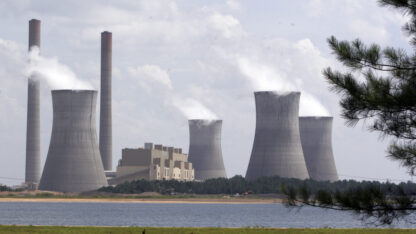Major U.S. science group lays out a path to smooth the energy transtion

It’s no big mystery: to slow down human-driven climate change, the U.S. and other countries need to cut carbon emissions fast and thoroughly.
The Biden administration has set the goal of hitting ‘net zero’ carbon emissions by 2050. That means bringing most fossil fuel burning to a near halt by then.
Major climate-focused laws passed in 2021 and 2022, like the Inflation Reduction Act, have put the country on a solid theoretical pathway toward hitting that goal, says a new report from the National Academies of Science, Engineering, and Medicine (NASEM) – but, it warns, the efforts are still nascent and fragile.
The two dozen engineers, scientists, medical specialists, and policy experts who authored the report developed a series of recommendations for how to take that theoretical pathway into concrete actions.
One of the most pressing issues on the wishlist? A concerted effort to ensure that the energy transition helps those most directly affected by climate change. The report’s authors say that effort also must address and remedy historical harms. For example, redlining policies from the 1930s still today leave many Black and brown communities bereft of trees and shade, which drives temperatures 5, 10, or 15 degrees higher. Similar policies have led to health-damaging infrastructure, like fossil fuel plants or highways, more often ending up in poor communities and communities of color.
“This is the first time that the National Academy of Sciences has devoted so much time and focus on energy justice and equity,” says Michael Mendez, a sociologist at the University of California, Irvine, and an author of the report.
The NASEM report is the second in a two-part series. The first, released in 2021, laid out a broad menu of policies that would result in major cuts to the country’s fossil fuel emissions. Many of those recommendations became centerpieces of major climate-focused laws like the Inflation Reduction Act in 2022 and 2021’s Bipartisan Infrastructure Law in 2021. Recent climate policy efforts, taken together, have the potential to cut America’s emissions by as much as 80% by 2030 if fully implemented, according to several independent analyses.
“A lot of what [the first report] recommended got adopted in spectacular legislation,” says Stephen Pacala, the report’s lead author and an ecologist at Princeton University. “So our second report is very much in reaction now to [these] comprehensive pieces of legislation,” he says.
Equity isn’t an afterthought
Figuring out how to put equity at the center of climate policy isn’t just a question of ethics, says Patricia Romero-Lankao, an energy sociologist now at the University of Toronto and a report author. Equity is also a critical practical tool. The NASEM report stresses that many of the technological strategies needed to transition the country away from fossil fuel dependency exist, yet other factors slow the transition down.
“The transition is not only technical but social, and political, and institutional,” says Romero-Lankao.
Renewable energy costs, for example, have become more competitive to fossil fuels, helping to spur the transition along on its own. Within the last decade the cost of utility-scale solar projects dropped by roughly 90%, while the cost of lithium-ion batteries for electric vehicles has fallen by more than 80%, according to the Department of Energy.
People’s choices matter. If communities don’t want solar farms in their city limits, or if they don’t want electric car charging stations taking up parking spots, those technologies won’t spread as fast as they need to.
Often, Romero-Lankao says, the message she has heard from technologically focused scientists and planners is that “we cannot wait–the transition needs to happen like yesterday.” The sociologists, she says, will agree, “but you better wait and listen and work with communities – because if you don’t do it, you will get a lot of pushback from it.” That means projects can slow or even stop completely.
Shortly after President Biden took office, he signed an executive order that included a mandate, the Justice40 Initiative, to direct 40% of the investments from major climate policy toward historically disadvantaged communities. The NASEM report suggests that order gets codified into law so it will remain a long-term, robust part of future decision-making.
Christopher Tessum is an air pollution expert at the University of Illinois Urbana-Champaign who wasn’t involved in the report. “This is a major technological transition we have to undertake,” he says – and it needs to happen faster than any previously undertaken. “In the past [the transitions] have not happened equitably. There are clear winners and losers. For this one to succeed, because we need buy-in from everyone, we really need it to be equitable.”
There’s more to be done
The report highlights a major gap in the current policy landscape: how to track the successes and failures of new climate policy. No comprehensive, centralized clearinghouse – or agreed-upon way – to keep track of how the vast investments in climate policy are working exists. That’s an opportunity for problems, the report stresses.
On a practical and technical level, the existing laws don’t go far enough to push buildings and heavy industry toward fossil-fuel-free futures, the report says. It points out that buildings alone account for about 35% of carbon emissions in the U.S.
“For whatever reason, the current policies don’t go as far as they need to go,” says Pacala. “We have identified 10 different things that could be done to get billion metric tons per year of cuts to carbon emissions from buildings,” he says. That includes everything from investing in programs like the Low Income Home Energy Assistance Program to strengthening and clarifying building codes to prioritize electrification.
The last few years have seen an incredible increase in government-driven climate action, says Pacala. But “the stakes couldn’t be higher. We have one shot at this,” he says. “We need to implement what we now have [in plans]. We are only going to do that if we are relentless.”
9(MDAxODM0MDY4MDEyMTY4NDA3MzI3YjkzMw004))








